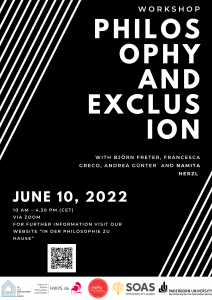The Talks from the workshop “Philosophy and Exclusion” held on June 10, 2022 are now available on our YouTube channel.

Thematic background of this event:
Philosophy often presents itself as an enterprise in which everyone is invited to participate. On closer inspection, however, it is striking to note that a significant number of people have been and are being excluded by philosophers as unfit for philosophy. If we look at the history of Western philosophy, we soon find that certain human beings have been radically excluded time and time again. Since the eighteenth century, for example, it can be clearly stated that philosophers who were not perceived as male, who were not racialized as white, or who were not ascribed to Western culture, were systematically excluded from philosophy. However, in this very story, we cannot find not a single philosophical argument that could justify this exclusion. This is hardly surprising; it is doubtful that there can be such a philosophical justification. Who should legitimately be able to have this right? And yet it is a factual reality that philosophy is not ruled by all human beings, but only by very specific human beings. This is certainly not because only these particular human beings practice philosophy, but because these particular human beings, knowingly or not, keep alive a tradition of exclusion. In this workshop, we wish to expose this phenomenon from different perspectives be it based on examples, be it through general reflections. We want to promote an exchange on this problematic dimension of philosophy and its history and thus contribute to the ongoing change of the discourse and a renewal of the canon.
The first talk is by Namita Herzl from the University of Hildesheim on “Philosophical Mechanisms of Marginalization in a Global Perspective”. The second talk, on “The Cycle of Superiorism. Practices of Exclusion in Western Philosophy”, was given by Björn Freter from the University of London and the last talk was by Francesca Greco, also from the University of Hildesheim, on “Practices of Exclusions”.
You cannot copy content of this page








